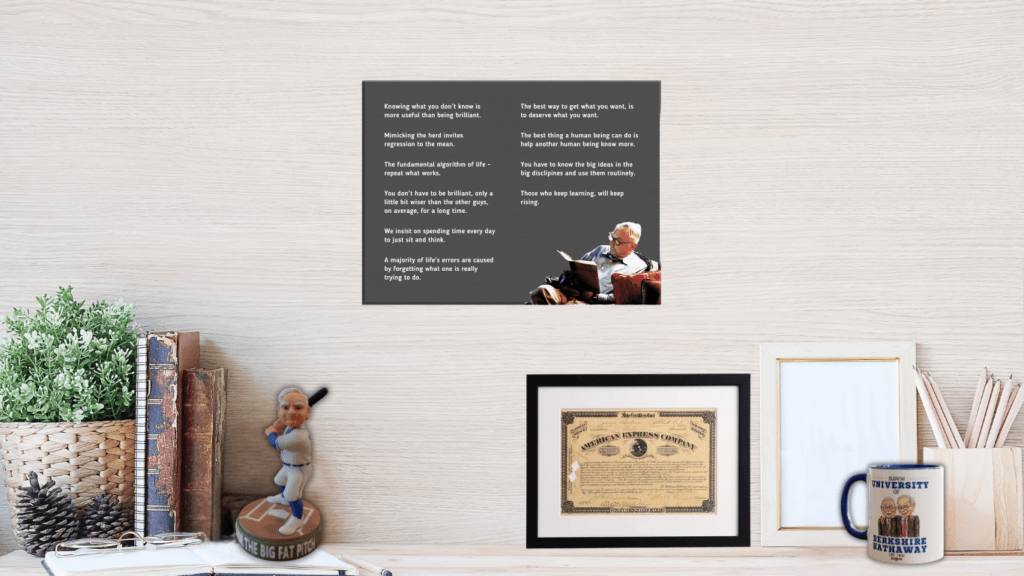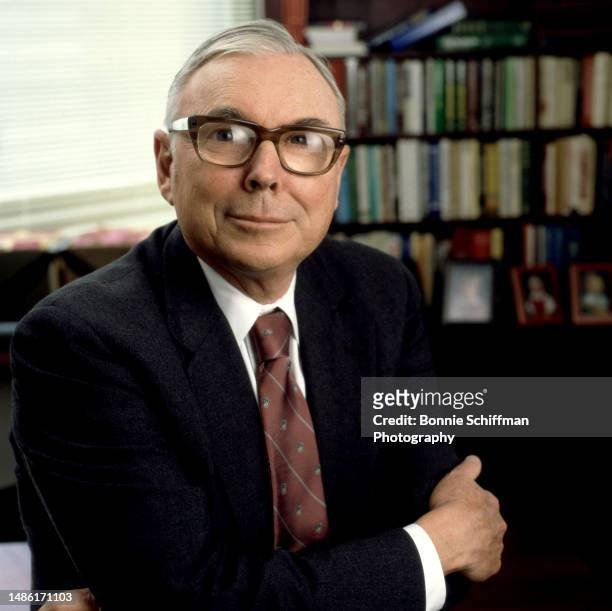6 Principles of Charlie Munger for Lifelong Success
Timeless Wisdom from the Legendary Investor on Lifelong Learning, Mental Models, and Achieving Success
Charlie Munger was a billionaire businessman, investor, and Warren Buffett’s partner for more than 60 years. Together they built Berkshire Hathaway into a mega-billion behemoth American conglomerate. Munger was a dynamic, wise, rational, straight-shooting pragmatist.
He passed away in 2023 at the age of 99 but his words, wisdom and his legacy will live on forever.
Munger often quoted Newton’s line “If I have seen further, it is by standing on the shoulders of giants.”
And he became one of the GOATs amongst ‘giants’.

He read countless books and studied a broad range of disciplines including history, business, investing, science, architecture, etc. He considered polymaths like Benjamin Franklin and Charles Darwin as his heroes and believed that without the method of continuous learning, you are like a ‘one-legged man in an ass-kicking contest’.
One of Munger’s many skills was to be able to distill big ideas (i.e. principles) into punchy, one-line quotes. I picked six of his mantras that impacted my thinking.
“Invert, Always Invert”
Munger often quoted the late mathematician Jacobi when he advised us to ‘invert’ a complex problem to find ways to chip away at it. While it doesn’t solve the problem, it helps in avoiding trouble.
What does inversion mean? It is a method where instead of asking ‘How can I win?’, you ask yourself ‘What can I do to make sure I lose?’ and do everything in your power to avoid doing those things.
Munger famously said “All I want to know is where I’m going to die so I’ll never go there”, which is an example of inversion. He simply aimed to avoid failure, which was foundational for attaining success. As Shane Parrish says in his wonderful article on inversion, “Avoiding stupidity is easier than seeking brilliance.”
If I apply ‘inversion’ to investing – instead of asking how I could compound my portfolio at high rates of return, I should ask ‘What can I do to lose all my money?’ and avoid doing things like speculating, following the herd, which could lose me money.
There are a million ways to use inversion in life. I wrote an article on inversion to drill down further into this mental model.
Coffee Mug with the Charlie Munger quote Invert Always Invert
About the Quote: Charlie Munger borrowed from mathematician Carl Jacobi, when he says “INVERT, ALWAYS INVERT”. Charlie said that many […]
“Be a continuous learning machine”
In an interview, Munger said “Climb as high as you can by advancing one inch at a time, that’s the secret of life.” He lived his life by this principle. He was constantly learning, right until the end.
How did he manage to keep learning for such a long period of time?
He enjoyed learning, and harnessed his curiosity by learning about the things that he was most passionate and excited about. He read across multiple disciplines such as psychology, mathematics, stoicism, philosophy, etc. He read biographies to master the best of what other people had figured out.
Why is continuous learning important? Munger noticed that successful people were constant, active, fanatical learners, and that was their secret sauce to success. Being a continuous learner also allowed him to have a ‘prepared mind’, i.e. the ability to identify and capitalise on a handful of big investing opportunities that arose in his lifetime.
“All of humanity’s problems stem from man’s inability to sit quietly in a room alone.”
Munger quoted Pascal, who said “All of humanity’s problems stem from man’s inability to sit quietly in a room alone,” He advised us to actively carve out time to think and analyse problems, decisions and insights.
He practiced ‘thinking for oneself’ through reading and learning facts and opinions, and then forming his own thoughts and opinions on the topic. Independent thinking also helped him in avoiding the mentality of mindlessly following the herd.
He applied independent thinking to great effect in investing. While the investing world has a huge bias towards being active (i.e. buying and selling stocks), Munger was perfectly happy to be inactive for long periods of time.
“The big money is not in the buying or the selling, it is in the waiting.” Inactivity or ‘sitting on your ass’ is not a bad thing; if you invest in wonderful businesses you just have to let your winners run and let compounding work its magic.
Munger’s portfolio compounded at a market beating 19% per annum over a period of 60+ years which is evidence of his successful long term, independent thinking approach.
“I’m trying to get lollapalooza effects by getting two or three mental models working together in the same direction. This is the way you win big in the world”
Munger popularised the term ‘mental model’, which is a distillation of a big idea or a principle. Mental models exist in various fields of study. For example, inversion comes from mathematics, confirmation bias, reciprocity and social proof come from psychology, margin of safety is from engineering, compound interest is from mathematics and natural selection is from biology.
One of his legacies is his insight that mental models often work in conjunction. The combination of these mental models all moving in the same direction creates the potential for a lollapalooza effect – i.e. when forces combine, they don’t just add up; each force builds off of and strengthens the other, creating an explosive effect with huge results.
It is like critical mass in physics where you get a nuclear explosion if you get to a certain point of mass—and you don’t get anything worth seeing if you don’t reach the mass.
As an example, the popularity of Coca Cola is a lollapalooza effect due to a combination of:
- A cold drink that quenches thirst (which is a perception created by the company through advertising)
- Using caffeine, a stimulant that gets people hooked
- Social proof, because everyone else is drinking it so it must be good
The appeal of the lollapalooza effect has made me super curious about mental models in various fields. My own rather crude take is that identifying the lollapalooza effect is a three step process:
- Step 1 – collect as many mental models as possible
- Step 2 – use independent thinking to find patterns and interplay between these models
- Step 3 – identify real world lollapalooza situations where multiple mental models combine to generate exponential outcomes.
Need at least a lifetime of learning and I might eventually make some progress on this one!
“Feeling like a victim is a perfectly disastrous way to go through life”
Munger was no stranger to adversity. In his thirties, he went through some horrible, unfair blows. A divorce cost him everything, including his home. A short time later, his 9-year-old son died from leukemia. A few years later, he lost an eye due to a horrific cataract surgery and almost lost his vision in his other eye.
Through all this, Munger remained undeterred. He vowed to never drift into self-pity because he believed that self-pity would not solve problems.
“Feeling like a victim is a perfectly disastrous way to go through life. If you just take the attitude that however bad it is, it’s always your fault and you just fix it as best you can … I think that really works.” In another interview, he said “I am not a victim. I am a survivor.”
This sums up his mindset to life.
While avoiding self-pity makes sense intuitively, I found it extremely hard to implement. The goal of ‘No-self-pity’ is very much a work-in-progress at this stage.
“To get what you want, you have to deserve what you want.”
Munger lived his life based on the philosophy that to get what you want, you have to deserve it. If you want a good partner, you should first be a good partner. And that’s what Munger was to Buffett, a damn good partner.
Munger believed that if you behave in a way that you wished other people would towards you, you will win their respect and eventually their trust. He believed that trust is one of the greatest economic forces in the world.
This approach is simple but hard to put to practice – I hope that one day I will be able to model my behaviour to align with how I wished people on the other end behaved.
Takeaways
While the above mantras resonated the most with me, these are just one little ounce from the tons of pure wisdom that Munger openly shared over the years, which is exciting because there is a lot more wisdom to be gained!
I will conclude with another one of my favourites – Munger believed that the best thing a human being can do is to help another human being know more. He lived by this philosophy by openly sharing his principles, insights, and secrets to a fulfilling life.
I am passionate about shared knowledge and I endeavour to follow his lead by sharing what I learn during my journey of lifelong learning.
If you want to know learn more about Charlie Munger’s incredible wisdom, these three books on Charlie Munger are a great place to start:
- Poor Charlie’s Almanac by Peter Kaufman
- Charlie Munger: The Complete Investor by Tren Griffin
- The Tao of Charlie Munger by David Clark







